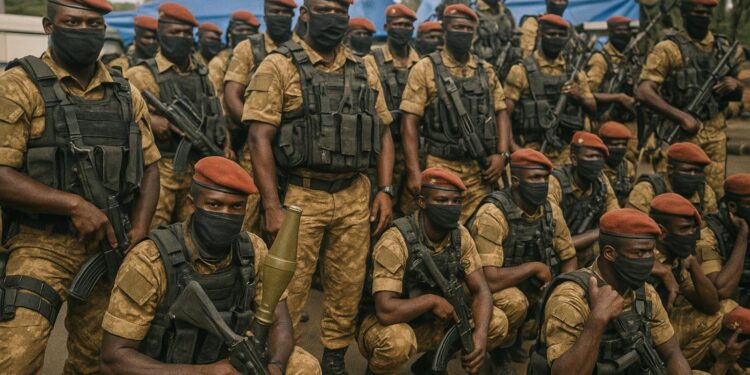Surge in Urban Security Operations
On 30 September, troops supported police “Coup de Poing” raids in Brazzaville’s densely populated arrondissements, targeting gangs known locally as “bébés noirs” and “kulunas”. Residents applauded the swift arrests, describing a welcome return of night-time circulation after months of fear.
Civil Society Raises Due-Process Concerns
Hours later the Centre d’Actions pour le Développement, led by advocacy head Guerschom Gobouang, issued a statement lauding the objective of safer streets yet cautioning against bypassing judicial safeguards. Replacing law by arms, the NGO argued, risks “institutionalising brutality” and eroding confidence in state institutions.
The organisation therefore urged a moratorium on purely military deployments and called for a structural justice plan guaranteeing equal access to counsel, transparent investigations, and accelerated court calendars.
Anatomy of the Congolese Judicial Challenge
Analysts note that magistrates’ workloads tripled over the past decade while budgets grew modestly, creating case backlogs exceeding 12 months in some tribunals. Rural litigants often travel hundreds of kilometres to file complaints, a cost barrier that fosters out-of-court settlements or, in criminal matters, vigilantism.
The Ministry of Justice has already drafted a five-year modernisation roadmap, emphasising training, digital registries, and alternative dispute mechanisms. The CAD says its proposal complements those priorities by insisting on predictable funding and a citizen monitoring dashboard.
Government Balancing Security and Rule of Law
Officials underline that the President’s office authorised the weekend deployment strictly to reinforce police, not to supplant courts. A senior officer interviewed on public radio stressed that detainees are transferred to judicial custody within legal deadlines, and that evidence is compiled for prosecutors as prescribed by the Code of Criminal Procedure.
The Interior Ministry further highlights the popular mandate for decisive action, citing municipal surveys showing 72% of Brazzaville residents ranking street crime as their top concern. “Public security is the first right,” an adviser said, adding that justice reform and security operations are “two tracks of the same policy”.
Investor and Business Angle
Persistent petty crime can inflate logistics premiums and discourage evening retail activity, weighing on the services sector that contributes nearly half of urban GDP. Conversely, predictable justice reduces reputational risk for foreign firms and underpins planned public-private partnerships in ports, housing and digital infrastructure.
The Congo’s latest Doing Business indicators already reflect incremental gains in contract enforcement following the 2020 commercial code revision. A consolidated judicial reform, experts say, could shave another 30 days off average dispute resolution times and strengthen the sovereign’s appeal to infrastructure financiers.
Regional Comparisons Offer Lessons
Cameroun’s 2017 creation of specialised gang courts and Gabon’s digital docketing experiment illustrate that swift security responses can be coupled with procedural safeguards. Observers suggest Brazzaville could replicate neighbouring e-record initiatives to track custody duration and reduce pre-trial detention.
International partners, including the African Development Bank and UNDP, have previously financed legal aid clinics in the region. Targeted grants and technical assistance could accelerate Congo’s roadmap without imposing externally driven conditionalities.
Towards an Inclusive Reform Consensus
The CAD proposes a national forum gathering magistrates, security forces, civil society, business, and traditional leaders to align on timelines and metrics. Such a dialogue, analysts argue, would convert current tension into a co-owned reform pact and provide early-warning mechanisms against future rights deviations.
Legal scholars from Marien-Ngouabi University add that community policing pilots and restorative justice for minor offenders could ease prison overcrowding, freeing resources for complex cases and reinforcing social cohesion.
Outlook for Stability and Growth
With urban demographics rising and regional trade corridors expanding, Brazzaville’s twin challenge is to entrench safety while reinforcing the rule of law. A calibrated mix of targeted enforcement, court modernisation and civic oversight can deliver both, bolstering investor confidence and citizen trust.
As the security crackdown continues, all eyes turn to the forthcoming justice budget and legislative calendar. The coming months will reveal whether the momentum generated by the “Coup de Poing” operation evolves into a comprehensive legal reform beneficial to communities and markets alike.












































